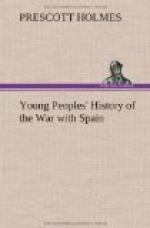[Illustration: The “Olympia” Leading the Way.]
After more than two hours of fierce fighting, Commodore Dewey led his ships out into the center of the bay, and the battle ceased for a time. The true reason for this movement was known only to some of the officers. The men were told that they were to haul off to get a little rest and some breakfast. The men believed that they had done great damage to the Spaniards, and were eager to finish the battle at once. In fact, no one really knew then how much damage had been done to the Spanish fleet. The results were not known till afterward. Though the men were hopeful and in good spirits, Commodore Dewey and his staff thought the situation serious. Three of the Spanish ships were on fire, and the Boston had also broken out in flames. The Olympia had not enough ammunition to continue the fight two hours longer. Our ships were far from home, and could not get a supply of ammunition in less than a month’s time. There was good reason to think that the Spanish forts were well supplied.
The Spaniards thought, when our ships drew away from the shore, that the Americans had been overcome and were leaving in order to bury their dead. They found themselves sadly mistaken.
Our men, strengthened by the rest and a breakfast of bread and cold meat, started again to battle a little before eleven o’clock. Soon several of the Spanish ships were on fire, and some of them sank. After the Spanish fleet had been destroyed, some of our ships attacked the forts on the shore and made them surrender. At five minutes after one o’clock the Spaniards hauled down their flag.
The Spaniards did many brave things that day, and fought desperately, but they were not good marksmen. They did not aim their guns well. They lost eleven ships, and had many men killed and wounded. Our ships were not much injured, only seven of our men were wounded, and none were killed.
When our ships drew together after the battle, and our men found that they had suffered so little, and that no one had been killed, they knew not how to control their feelings. Some of them cried like little children. But such tears are not childish. It is said that when the Spanish forts gave the signal of surrender, Commodore Dewey turned to his officers near him, and said: “I’ve the prettiest lot of men that ever stepped on shipboard, and their hearts are as stout as the ships.”
[Illustration: The Destroyed Spanish Fleet.]
You must notice that the city of Manila had not been taken in this battle. We shall see later about its surrender. But the battle of Manila Bay was one of the most remarkable naval battles ever fought.
When Commodore Dewey received his orders to “capture or destroy” the Spanish fleet, that was known to be somewhere about the Philippine Islands, the Asiatic squadron, as his ships were called, was lying in the harbor of Hong Kong, which is an English port. After the blowing up of the Maine, which occurred in February, you will remember, he began to put his ships in the very best possible condition for a war with Spain, which he and his officers now thought inevitable. Every emergency was provided for; all the vessels were in complete fighting trim.




